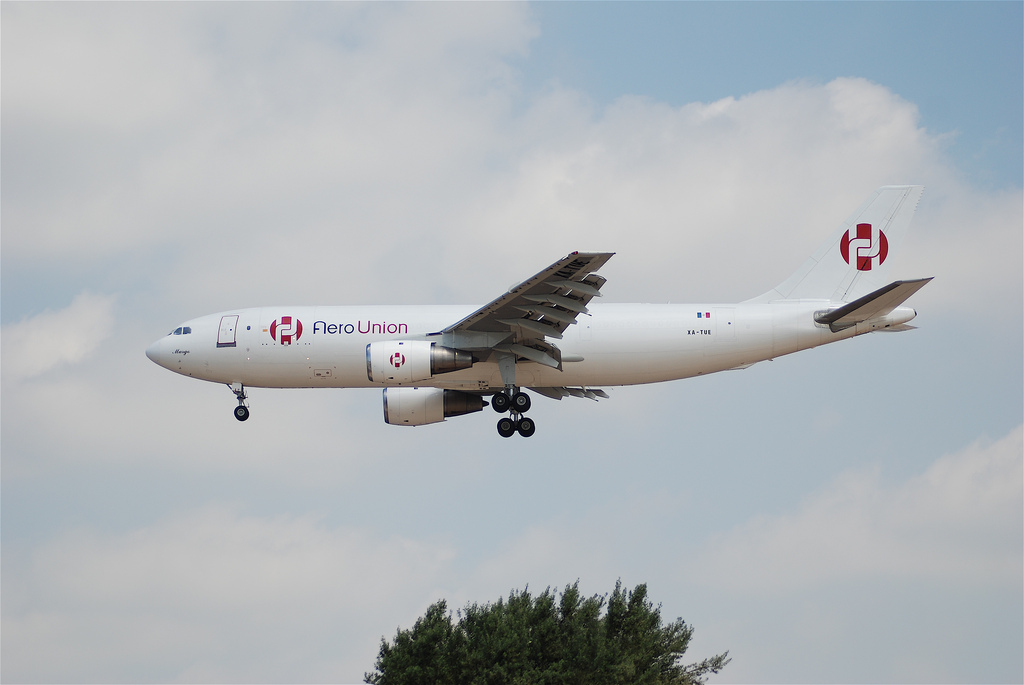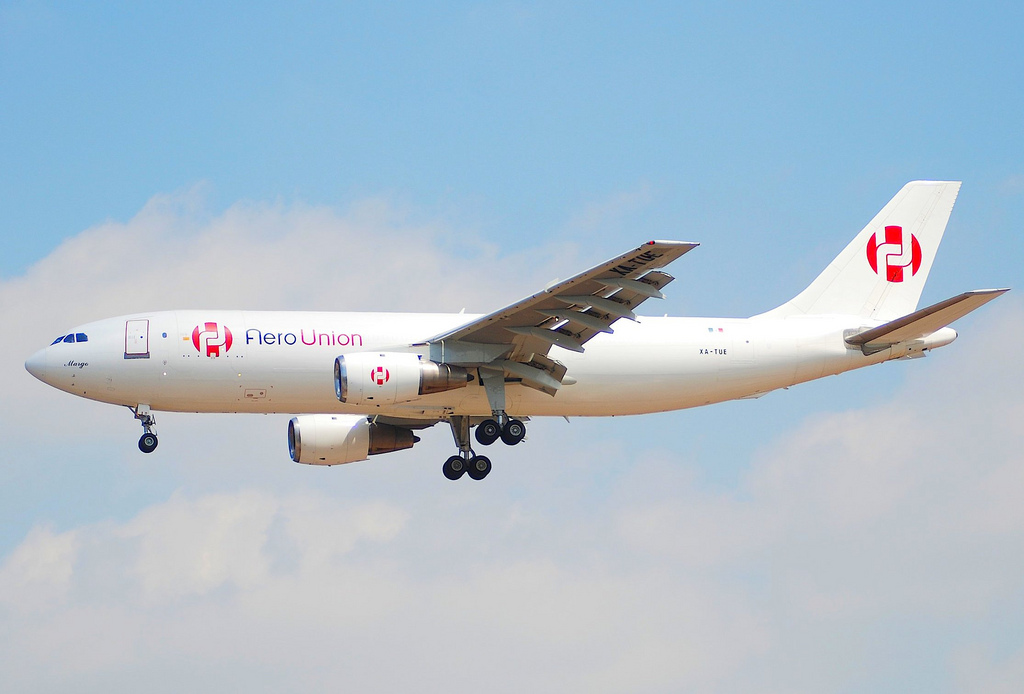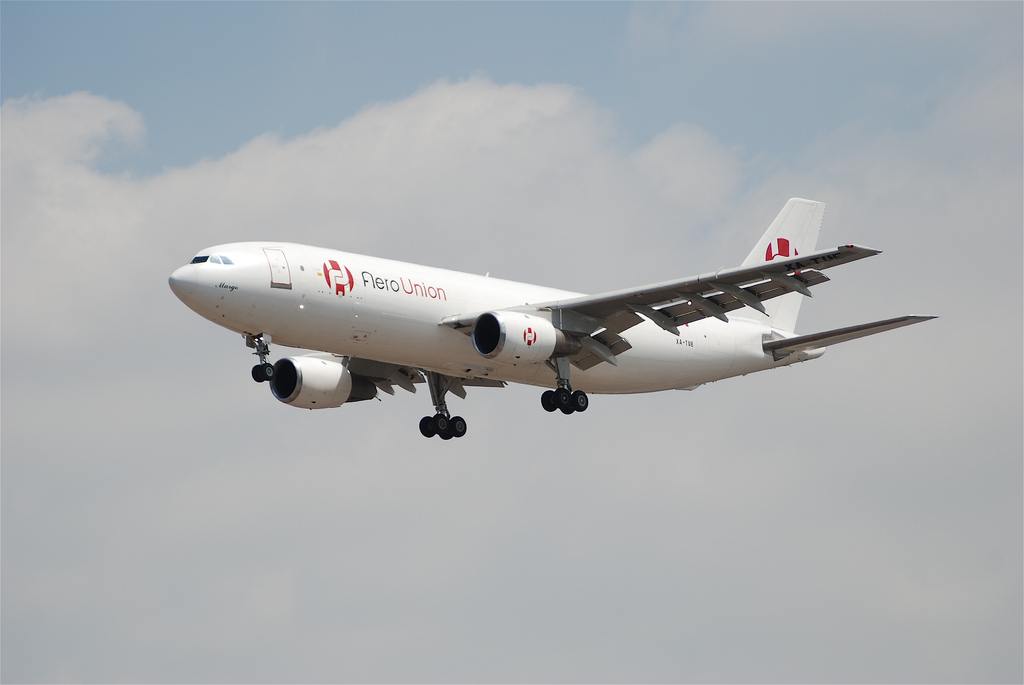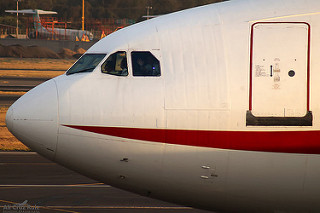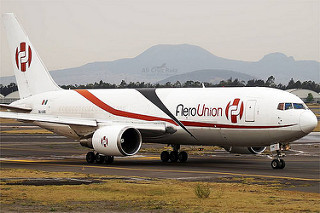AeroUnion A30B at Monterrey on Apr 13th 2010, lost height on approach and impacted highway
Last Update: August 3, 2018 / 22:00:38 GMT/Zulu time
Incident Facts
Date of incident
Apr 13, 2010
Classification
Crash
Airline
Aerounion
Departure
Mexico City, Mexico
Destination
Monterrey, Mexico
Aircraft Registration
XA-TUE
Aircraft Type
Airbus A300
ICAO Type Designator
A30B
Airport ICAO Code
MMMY
Mexican Police has cordoned the area off.
Mexican Authorities confirmed 5 fatalities saying, that two people were on the aircraft and three on the ground. The airplane had just departed Monterrey towards Los Angeles when it hit the ground.
Airbus reported, that the airplane was flying from Mexico City to Monterrey and on approach to Monterrey in rain showers and thunderstorms, when it impacted ground. The airframe was the first built in 1979, was converted to a freighter in 1998 and was acquired by AeroUnion in 2002. The airplane had accumulated about 55200 flight hours in approx. 27600 cycles and was powered by CF6 engines.
Flight TNO-302 (6R-302) had originated in Mexico City and was to fly to Los Angeles via an intermediate stop in Monterrey.
In August 2018 The Aviation Herald was able to obtain the final report in Spanish concluding the probable cause of the crash was:
While on a missed approach the aircraft impacted terrain as result of loss of control.
Contributing factors were:
- Lack of crew resource management (coordination) amongst the crew
- Reduced situation awareness
- standard operating procedures not being followed
- non-stabilized approach in a non-precision approach procedure
- improper aircraft configuration
- adverse weather conditions
The Direccion de Investigacion de Accidentes e Incidentes de Aviacion (DIAIA) reported the aircraft was performing a VOR/DME 1 Approach to Monterrey's runway 11. The captain (ATPL, 16,754 hours total, 5,446 hours on type) was pilot flying, the first officer (CPL, 3,114 hours total, 1,994 hours on type) was pilot monitoring. A flight engineer, a maintenance technician and an observing pilot (CPL) complemented the crew. Airport elevation was 1278 feet MSL. The final report never mentions the actual MDA altitude/height nor does it contain the complete approach chart active at the time, according to the chart VOR/DME-1 for MMMY effective Jan 11th 2011 the MDA was 1740 feet MSL (464 feet AGL), the missed approach point (MAP) was over the VOR (0 DME).
The aircraft had completed the descent and entered the VOR/DME-1 approach procedure on the outbound leg descending to 4000 feet MSL, slowing the aircraft to 140 KIAS while extending the flaps to 15 degrees (slats at 16 degrees), gear was still retracted. The autopilot was active, however, autothrust was off. While in the procedure turn to intercept the VOR radial and levelling off at 4000 feet the speed of the aircraft decayed to 129 KIAS, the angle of attack increased to 13 degrees nose up, the limit of the low speed protection is temporarily exceeded. The thrust levers are adjusted and the aircraft stabilizes at 4000 feet and 140 KIAS while rolling out of the turn. Passing through 9 DME the aircraft descends further to 3100 feet and subsequently continues the descent to the MDA (Minimum Descent Altitude) on autopilot.
While descending towards the MDA the crew reads checklists but is interrupted several times when the crew looked out in search for the runway. At about 1000 feet AGL the checklists are completed, the speed decreased to 110 knots below 1000 feet AGL for about 30 seconds without reaction by the crew. Attempts are being made to pull the control column which resulted in even further speed decay and increased angle of attack, the stick shaker and stall warning activated, the Alpha Floor protection kicked in and accelerated the engines to maximum thrust.
In response to the pitch up moment produced by the accelerating engines the control column is pushed forward (equivalent to about 8kg) for about 30 seconds, however, the trim is not being adjusted. The crew decides to initiate a go-around, at that point the aircraft was at 500 feet AGL at 134 KIAS. The autopilot was disengaged, the trim was still not adjusted, the position of the horizontal stabilizer remained at 10.25 degrees until impact. The crew pushed the control column to its forward stop (10 degrees nose down), the aircraft pitched up reaching an angle of attack of 41 degrees nose up while climbing from 1750 feet MSL to 3800 feet MSL. The speed decayed to a minimum of 70 KIAS, the stick shaker and stall warning activated, the control column was kept at its forward stop, the aircraft began to descend, the last 10 seconds of flight show the control column kept at its maximum backward position, trim not adjusted, engines developing maximum thrust while the aircraft was losing height until impact at the side of the airport access road about 700 meters/2300 feet right (south) of the extended runway center line and about 2110 meters/6920 feet short of the runway 11 threshold. All occupants perished, one person on the road was killed, the wreckage was spread over an area of 100 by 45 meters (330 by 150 feet). The access road was closed for about 24 hours.
The DIAIA analysed that following the temporary stick shaker activation during the procedure turn to final the aircraft continued the approach with autopilot and autothrust active. The aircraft overflew the final approach fix (FAF) at 6 DME without being configured for landing (editorial note: there is no mention that the gear was lowered or the flaps extended beyond 15 degrees), while overflying the FAF the autopilot is switched to "MAN" mode (meaning it remained engaged) and autothrust systems are disengaged. At 1700 feet MSL at about 3.2 DME the crew reported they were going around. Although the speed has not changed signficantly at 2.6 DME the aircraft begins a pronounced climb to 3700 feet with the speed decaying and without crew actions to recover, as result control of the aircraft was lost, the speed decayed to a minimum of 70 KIAS.
Metars:
MMMY 140550Z 11012KT 3SM RA BKN006 OVC025CB 19/19 A3000 RMK SLP159 51019 908 61205 8/9// LTGIC SHRAE30BRA
MMMY 140445Z 11014KT 1SM SHRA BKN006 OVC025CB 19/19 A2998 RMK 60805 8/9// LIGIC
MMMY 140420Z 11012KT 3SM SHRA BKN006 OVC025CB 20/19 A2999 RMK 8/9// SHRAB15 LTGIC
MMMY 140342Z 10014KT 7SM -RA BKN006 BKN025CB OVC050 20/19 A2998 RMK 61105 8/9// HZ LTGIC
MMMY 140325Z 11012KT 7SM BKN004 BKN020CB OVC050 20/19 A2998 RMK 8/9// SHRAE15 OCNL DROPS LTGIC
MMMY 140248Z 12010KT 4SM SHRA BKN020CB OVC070 20/19 A2996 RMK SLP140 53031 961 60705 8/97/ PRESRR
MMMY 140150Z 08010KT 10SM SHRA BKN030CB OVC070 20/19 A2992 RMK 60805 8/97/
MMMY 140137Z SPECI 08014KT 10SM SHRA BKN030CB OVC070 21/19 A2992 RMK 8/97/ SHRAB30
MMMY 140137Z 08014KT 10SM SHRA BKN030CB OVC070 21/19 A2992 RMK 8/97/ SHRAB30
MMMY 140044Z 08012KT 15SM BKN050 OVC070 23/19 A2989 RMK 8/57/ CB/RA NE/SE/E/SSW
MMMY 132350Z 00000KT 15SM BKN045 OVC070 24/18 A2988 RMK SLP105 55016 983 8/57/ CB/RA E/SE/S
Incident Facts
Date of incident
Apr 13, 2010
Classification
Crash
Airline
Aerounion
Departure
Mexico City, Mexico
Destination
Monterrey, Mexico
Aircraft Registration
XA-TUE
Aircraft Type
Airbus A300
ICAO Type Designator
A30B
Airport ICAO Code
MMMY
This article is published under license from Avherald.com. © of text by Avherald.com.
Article source
You can read 2 more free articles without a subscription.
Subscribe now and continue reading without any limits!
Read unlimited articles and receive our daily update briefing. Gain better insights into what is happening in commercial aviation safety.
Send tip
Support AeroInside by sending a small tip amount.
Related articles
AeroUnion A306 at San Jose on Feb 23rd 2023, tail strike on landing
An AeroUnion Airbus A300-600 freighter on behalf of Avianca Cargo, registration XA-UYR performing flight QT-4171 from Miami,FL (USA) to San Jose…
AeroUnion A306 at Bogota on Jan 30th 2020, burst tyres, gear fire
An AeroUnion Airbus A300-600 on behalf of Avianca Cargo, registration XA-LFR performing flight QT-4139 from Miami,FL (USA) to Bogota (Colombia),…
AeroUnion A306 at Guadalajara on Feb 6th 2019, tail strike on landing
An AeroUnion Airbus A300-600 freighter, registration XA-UYR performing freight flight TNO-301 from Los Angeles,CA (USA) to Guadalajara (Mexico),…
AeroUnion A30B at Mexico City on Jul 23rd 2018, anti-skid failure blows 3 main tyres on landing
An AeroUnion Airbus A300B4 freighter, registration XA-MRC performing flight 6R-303 from Los Angeles,CA (USA) to Mexico City (Mexico), landed on…
AeroUnion B762 at Los Angeles on Dec 5th 2017, streak of flame and heavy smoke from engine
An AeroUnion Boeing 767-200 freighter, registration XA-LRC performing freight flight 6R-301 from Los Angeles,CA (USA) to Guadalajara (Mexico) with 2…
Newest articles
Angara AN24 at Tynda on Jul 24th 2025, aircraft missing after go around, found crashed
An Angara Airlines Antonov AN-24 on behalf of Aurora Airlines, registration RA-47315 performing flight HZ-2311 from Blagoveshchensk to Tynda (Russia)…
StarSky F50 at Mogadishu on Feb 10th 2026, runway excursion
A StarSky Fokker 50, registration 6O-YAS performing a flight from Mogadishu (Somalia) to Galkayo (Puntland) with 55 people on board, was climbing out…
Subscribe today
Are you researching aviation incidents? Get access to AeroInside Insights, unlimited read access and receive the daily newsletter.
Pick your plan and subscribePartner

ELITE Simulation Solutions is a leading global provider of Flight Simulation Training Devices, IFR training software as well as flight controls and related services. Find out more.
SafetyScan Pro provides streamlined access to thousands of aviation accident reports. Tailored for your safety management efforts. Book your demo today
AeroInside Blog
Popular aircraft
Airbus A320Boeing 737-800
Boeing 737-800 MAX
Popular airlines
American AirlinesUnited
Delta
Air Canada
Lufthansa
British Airways
